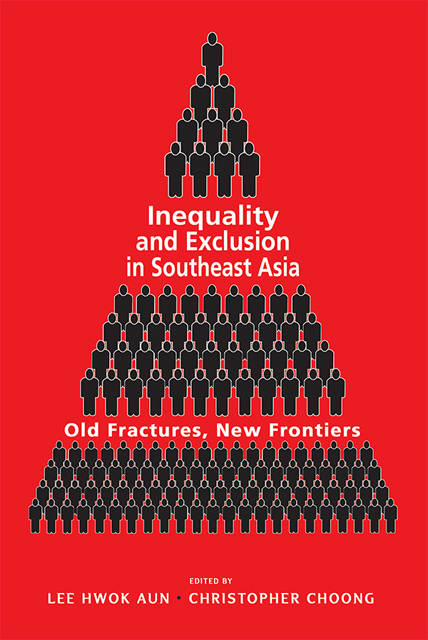Book contents
- Frontmatter
- Contents
- List of Tables
- List of Figures
- Acknowledgements
- About the Contributors
- 1 Introduction: Inequality and Exclusion in Southeast Asia
- 2 Cambodia’s Experiences in Addressing Inequality
- 3 Inequality and Exclusion in Post-Soeharto Indonesia
- 4 Inequality and Exclusion in Malaysia: Macro Trends, Labour Market Dynamics and Gender Dimensions
- 5 Inequality in Myanmar: Structural Change, Policy Outcomes and Gender Dimensions
- 6 Structural Inequality in the Philippines: Oligarchy, Economic Transformation and Current Challenges to Development
- 7 Inequality and the Social Compact in Singapore: Macro Trends vs Lived Inequalities
- 8 Inequality in Thailand: Income, Socio-economic and Wealth Dimensions
- 9 Trends and Drivers of Inequality in Vietnam
- 10 Conclusion: Old Fractures and New Frontiers
- Index
3 - Inequality and Exclusion in Post-Soeharto Indonesia
Published online by Cambridge University Press: 01 September 2023
- Frontmatter
- Contents
- List of Tables
- List of Figures
- Acknowledgements
- About the Contributors
- 1 Introduction: Inequality and Exclusion in Southeast Asia
- 2 Cambodia’s Experiences in Addressing Inequality
- 3 Inequality and Exclusion in Post-Soeharto Indonesia
- 4 Inequality and Exclusion in Malaysia: Macro Trends, Labour Market Dynamics and Gender Dimensions
- 5 Inequality in Myanmar: Structural Change, Policy Outcomes and Gender Dimensions
- 6 Structural Inequality in the Philippines: Oligarchy, Economic Transformation and Current Challenges to Development
- 7 Inequality and the Social Compact in Singapore: Macro Trends vs Lived Inequalities
- 8 Inequality in Thailand: Income, Socio-economic and Wealth Dimensions
- 9 Trends and Drivers of Inequality in Vietnam
- 10 Conclusion: Old Fractures and New Frontiers
- Index
Summary
INTRODUCTION
Rising economic inequalities have been a global concern. Global awareness of the problem was bolstered by the United Nations in its 2005 Report on the World Social Situation: The Inequality Predicament (UN 2005). Rising inequality across the globe has also brought the issue to the centre of attention of the world’s two leading multilateral organizations, the International Monetary Fund (IMF) and the World Bank, which were previously reluctant to point to inequality directly and rather focused solely on poverty, but are now openly discussing economic inequality and its social and economic consequences.
Since the advent of neoliberal globalization in the early 1980s, within-country inequality has been rising in most countries: in the advanced economies as well as in the developing world. In advanced economies of the Western world, economic inequality has been seen as a contributing factor to the 2008 global financial crisis (GFC) (Rajan 2010; Kumhof, Rancière and Winant 2015), but at the same time the responses to GFC also contributed to the surge in inequality (Klein and Winkler 2019). Rising economic inequality is also fuelling the more recent rise of right-wing populism of white supremacists. With a focus on the West, Piketty (2018) argues that the electoral results of parties with right-wing populist platforms are greater in countries that experienced higher increases in inequality and endured more severe impacts of the GFC—these are well represented by the Trump presidency in the United States and Brexit victory in the United Kingdom. In the developing world too, the rise of right-wing populism as in the case of Hindu-nationalists in India and Islamist-transnationalists in Indonesia, and the consequent polarization of society, can partly be explained by rising economic inequalities.
In the advanced economies, as in the United States and the United Kingdom, the surge in economic inequality has been characterized by the rise of income of the higher income groups while the income of the lower middle class stagnated. Concomitantly, higher income groups’ share of national income expands, while the share of lower income groups diminishes. This is captured by the trend of increasing per capita gross domestic product (GDP) over time while median income stagnates, which reflects how the lower middle-income groups have been particularly excluded from the growth process.
- Type
- Chapter
- Information
- Inequality and Exclusion in Southeast AsiaOld Fractures, New Frontiers, pp. 51 - 86Publisher: ISEAS–Yusof Ishak InstituteFirst published in: 2023



